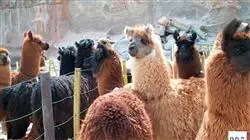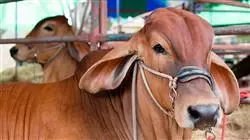University certificate
The world's largest faculty of veterinary medicine”
Introduction to the Program
The approach to neurological and ophthalmic diseases in ruminants, with all the specific developments that field work brings with it, in a Postgraduate certificate focused on real practice"

When working with ruminants, as the production animals that they are, it is considered essential to learn about Animal Production, which is combined with Anatomopathological Diagnosis, a fundamental part in the diagnosis of herd pathologies.
The first topics of the Postgraduate certificate deal with the study of necropsy together with the differential lesion diagnoses in the most frequent processes of ruminants, in addition to transmissible spongiform encephalopathies.
With respect to production, it examines the productive management of dairy cattle, beef cattle, and small ruminants for both meat and milk. Production management is focused on animal welfare, reducing environmental impact as much as possible. All this added with the optimization of the feeding for the different types of productions in their different productive phases.
Finally, a major basis of productivity is based on genetic potential. The last topic analyzes genetic improvement and selection with different methodologies that allow us to increase economic profitability.
Essential yet rare training for the specialist veterinary clinician that will set you apart as a specialist in this field of work"
This Postgraduate certificate in Animal Production and Ruminant Anatomopathological Diagnosis contains the most complete and up-to-date educational program on the market. The most important features of the program include:
- The latest technology in Online teaching software
- A highly visual teaching system, supported by graphic and schematic contents that are easy to assimilate and understand
- Practical cases presented by practising experts
- State-of-the-art interactive video systems.
- Teaching supported by telepractice
- Continuous updating and recycling systems
- Autonomous learning: full compatibility with other occupations
- Practical exercises for self-assessment and learning verification
- Support groups and educational synergies: questions to the expert, debate and knowledge forums.
- Communication with the teacher and individual reflection work
- Availability of content from any fixed or portable device with internet connection
- Complementary documentation banks permanently available, even after the course
The clinical, specialized and advanced fundamentals, based on veterinary evidence, that will allow you to face the daily intervention in cattle and ruminants"
Our teaching staff is made up of professionals from different fields related to this specialty. In this way, TECH makes sure to offer professionals the up-to-date objective it intends. A multidisciplinary team of professionals trained and experienced in different environments who will develop theoretical knowledge efficiently, but, above all, will provide students with practical knowledge derived from their teaching experience: one of the differential qualities of this program.
This mastery of the subject is complemented by the effectiveness of the methodological design. Developed by a multidisciplinary team of e-Learning experts, it integrates the latest advances in educational technology. In this way, the student will be able to study with comfortable and versatile multimedia tools that will give them the operability they need in their training.
The design of this program is based on Problem-Based Learning: an approach that conceives learning as a highly practical process. To achieve this remotely telepractice will be used: with the help of an innovative system of interactive videos and Learning from an Expert they will be able to acquire the knowledge as if they were facing the case you are learning at that moment. A concept that will make it possible to integrate and fix learning in a more realistic and permanent way.
With a methodological design based on proven teaching techniques, this innovative program will take you through different teaching approaches to allow you to learn in a dynamic and effective way”

Supported by evidence, the approach of this program will allow you to learn in a contextual way and acquire the skills you will really need in your daily practice”
Why study at TECH?
TECH is the world’s largest online university. With an impressive catalog of more than 14,000 university programs available in 11 languages, it is positioned as a leader in employability, with a 99% job placement rate. In addition, it relies on an enormous faculty of more than 6,000 professors of the highest international renown.

Study at the world's largest online university and guarantee your professional success. The future starts at TECH”
The world’s best online university according to FORBES
The prestigious Forbes magazine, specialized in business and finance, has highlighted TECH as “the world's best online university” This is what they have recently stated in an article in their digital edition in which they echo the success story of this institution, “thanks to the academic offer it provides, the selection of its teaching staff, and an innovative learning method aimed at educating the professionals of the future”
A revolutionary study method, a cutting-edge faculty and a practical focus: the key to TECH's success.
The most complete study plans on the university scene
TECH offers the most complete study plans on the university scene, with syllabuses that cover fundamental concepts and, at the same time, the main scientific advances in their specific scientific areas. In addition, these programs are continuously being updated to guarantee students the academic vanguard and the most in-demand professional skills. In this way, the university's qualifications provide its graduates with a significant advantage to propel their careers to success.
TECH offers the most comprehensive and intensive study plans on the current university scene.
A world-class teaching staff
TECH's teaching staff is made up of more than 6,000 professors with the highest international recognition. Professors, researchers and top executives of multinational companies, including Isaiah Covington, performance coach of the Boston Celtics; Magda Romanska, principal investigator at Harvard MetaLAB; Ignacio Wistumba, chairman of the department of translational molecular pathology at MD Anderson Cancer Center; and D.W. Pine, creative director of TIME magazine, among others.
Internationally renowned experts, specialized in different branches of Health, Technology, Communication and Business, form part of the TECH faculty.
A unique learning method
TECH is the first university to use Relearning in all its programs. It is the best online learning methodology, accredited with international teaching quality certifications, provided by prestigious educational agencies. In addition, this disruptive educational model is complemented with the “Case Method”, thereby setting up a unique online teaching strategy. Innovative teaching resources are also implemented, including detailed videos, infographics and interactive summaries.
TECH combines Relearning and the Case Method in all its university programs to guarantee excellent theoretical and practical learning, studying whenever and wherever you want.
The world's largest online university
TECH is the world’s largest online university. We are the largest educational institution, with the best and widest online educational catalog, one hundred percent online and covering the vast majority of areas of knowledge. We offer a large selection of our own degrees and accredited online undergraduate and postgraduate degrees. In total, more than 14,000 university degrees, in eleven different languages, make us the largest educational largest in the world.
TECH has the world's most extensive catalog of academic and official programs, available in more than 11 languages.
Google Premier Partner
The American technology giant has awarded TECH the Google Google Premier Partner badge. This award, which is only available to 3% of the world's companies, highlights the efficient, flexible and tailored experience that this university provides to students. The recognition as a Google Premier Partner not only accredits the maximum rigor, performance and investment in TECH's digital infrastructures, but also places this university as one of the world's leading technology companies.
Google has positioned TECH in the top 3% of the world's most important technology companies by awarding it its Google Premier Partner badge.
The official online university of the NBA
TECH is the official online university of the NBA. Thanks to our agreement with the biggest league in basketball, we offer our students exclusive university programs, as well as a wide variety of educational resources focused on the business of the league and other areas of the sports industry. Each program is made up of a uniquely designed syllabus and features exceptional guest hosts: professionals with a distinguished sports background who will offer their expertise on the most relevant topics.
TECH has been selected by the NBA, the world's top basketball league, as its official online university.
The top-rated university by its students
Students have positioned TECH as the world's top-rated university on the main review websites, with a highest rating of 4.9 out of 5, obtained from more than 1,000 reviews. These results consolidate TECH as the benchmark university institution at an international level, reflecting the excellence and positive impact of its educational model.” reflecting the excellence and positive impact of its educational model.”
TECH is the world’s top-rated university by its students.
Leaders in employability
TECH has managed to become the leading university in employability. 99% of its students obtain jobs in the academic field they have studied, within one year of completing any of the university's programs. A similar number achieve immediate career enhancement. All this thanks to a study methodology that bases its effectiveness on the acquisition of practical skills, which are absolutely necessary for professional development.
99% of TECH graduates find a job within a year of completing their studies.
Postgraduate Certificate in Animal Production and Anatomopathological Diagnosis of Ruminants
.
Animal production plays a crucial role in food security and the global economy. In this context, understanding the health and welfare of ruminants is essential to ensure sustainable and high quality production. The Postgraduate Certificate in Animal Production and Anatomopathological Diagnosis of Ruminants created by TECH Global University focuses on providing students with an in-depth knowledge of the health, pathologies and diagnosis in these animals. During the program, taught in online mode, participants will explore key aspects of animal production, with a specific focus on ruminants such as cows, sheep and goats. Topics such as nutrition, management, reproduction and disease control in the context of animal production will be addressed. Students will learn how to optimize the health and performance of ruminants to contribute to a more efficient and sustainable livestock industry.
The course is designed for students who are interested in ruminant production.
Learn about animal production and anatomopathological diagnosis of ruminants
.
Ruminant anatomopathological diagnosis is essential to identify and address health problems in livestock, which can have a significant impact on the production and quality of animal products. A key part of the Postgraduate Certificate focuses on anatomopathological diagnosis, which involves the identification and analysis of lesions and diseases in animal tissues. Students will learn necropsy techniques, sampling and histopathological analysis to better understand the causes and consequences of diseases in ruminants. This knowledge is essential for informed decision making in disease prevention and treatment. Animal production professionals and students interested in this field will find this Postgraduate Certificate a valuable opportunity to expand their knowledge and skills. In short, this is a very complete academic program, which brings together the latest methodologies, together with the best teachers.







